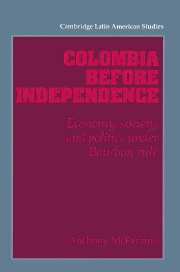Book contents
- Frontmatter
- Contents
- Tables and illustrations
- Acknowledgments
- List of money and measures
- List of abbreviations
- Introduction
- 1 Foundations
- PART I ECONOMY AND SOCIETY IN EIGHTEENTH-CENTURY NEW GRANADA
- PART II THE ECONOMICS OF BOURBON COLONIALISM: NEW GRANADA AND THE ATLANTIC ECONOMY
- PART III THE POLITICS OF BOURBON COLONIALISM: RECONSTRUCTING THE COLONIAL STATE
- PART IV GOVERNMENT AND POLITICS
- PART V CRISIS IN THE COLONIAL ORDER
- 11 War and the weakening of the colonial order
- 12 The fall of royal government
- Epilogue
- Appendix A The population of New Granada
- Appendix B Gold production
- Appendix C Shipping and commerce
- Bibliography
- Index
- CAMBRIDGE LATIN AMERICAN STUDIES
12 - The fall of royal government
Published online by Cambridge University Press: 17 September 2009
- Frontmatter
- Contents
- Tables and illustrations
- Acknowledgments
- List of money and measures
- List of abbreviations
- Introduction
- 1 Foundations
- PART I ECONOMY AND SOCIETY IN EIGHTEENTH-CENTURY NEW GRANADA
- PART II THE ECONOMICS OF BOURBON COLONIALISM: NEW GRANADA AND THE ATLANTIC ECONOMY
- PART III THE POLITICS OF BOURBON COLONIALISM: RECONSTRUCTING THE COLONIAL STATE
- PART IV GOVERNMENT AND POLITICS
- PART V CRISIS IN THE COLONIAL ORDER
- 11 War and the weakening of the colonial order
- 12 The fall of royal government
- Epilogue
- Appendix A The population of New Granada
- Appendix B Gold production
- Appendix C Shipping and commerce
- Bibliography
- Index
- CAMBRIDGE LATIN AMERICAN STUDIES
Summary
When Don Antonio de Amar y Borbón arrived at Bogotá in September 1803 to take up his post as viceroy, he took command of a territory that, in spite of all Spain's difficulties following the resumption of war with the British in 1804, was apparently secure under the government of the metropolitan power. The celebrations surrounding Amar y Borbón's inauguration were lavish and good humored, and his predecessor, Viceroy Pedro de Mendinueta, handed over office with a relación de mando that was positive and reassuring in its tone. Mendinueta warned Amar y Borbón to sustain vigilance against foreign subversion, to prevent the entry of foreign books and papers that might be harmful to religion and the state, and to be alert for “a philosophical fanaticism, and above all a spirit of novelty, (which) might turn a few heads, inducing them to accept notions which they indiscreetly profess as their own ideas.” But he concluded his relación de mando on a heartening note, stating that, despite some minor disturbances to public order, he had the satisfaction to hand over a territory in a “state of tranquillity, so that Your Excellency might discharge his responsibilities for the common good.” And Amar y Borbón did indeed pass a few uneventful years as viceroy, in which none of his experience as a high-ranking military commander in Spain was needed to manage the affairs of a land that, whatever the underlying disaffections of elements in its population, showed no obvious signs of unrest or political instability.
- Type
- Chapter
- Information
- Colombia before IndependenceEconomy, Society, and Politics under Bourbon Rule, pp. 324 - 346Publisher: Cambridge University PressPrint publication year: 1993



